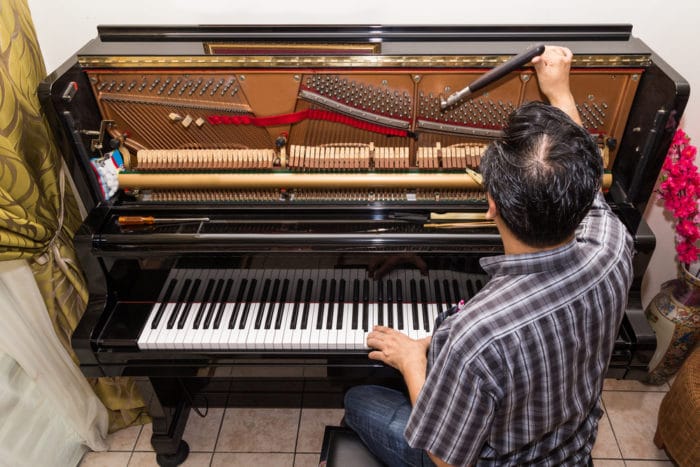Why We Love It
-
$38,590Potential Avg. Salary
-
3.5%Job Growth Rate
-
Growing DemandJob Outlook
-
Don't Take Work HomeCareer Attribute
Pianos are complex instruments that require oversight and technical expertise to improve performance over time. A piano tuner is in charge of tuning, repairing and regulating a variety of pianos to optimize sound and feel.
Recommended Schools
What is a Piano Tuner?
Duties
A piano tuner plays an important role in the musical instrument repair industry, including executing the following functions:
- Use a tuning fork or hammer to tune A or C in the middle of the piano, as well as other notes of the central octave.
- Assess and adjust the pitch of each note to ensure that intervals like the fifth or third sounds good.
- Repair or replace any broken strings in the piano using up to 13 specific tools.
- Put rubber or felt strips between piano strings to mute them for testing.
- Take apart and reconstruct piano models to their original condition or as per customer specifications.
Day In The Life
As a piano tuner, your day will involve making service calls on-site. Pianos are delicate and affected by aspects like temperature, humidity and the amount they are in use, leading to variations in daily workload. Piano tuning involves adjusting every string that is attached to a key, at the same frequency level.
While the main task is to tune the piano, other repair work might be required such as using tools to adjust strings, monitor the tension of the hammers, or fixing the piano keys. Tuning a piano takes around one hour and generally, piano tuners can tune up to six pianos per day.
Since most of your work is on-location, much of your day is spent traveling to different locations to tune pianos. There are rare circumstances where you will also be responsible for rebuilding pianos based on the customers’ requirements, so spending time in a workshop would be required in that case.
Work Schedule And Typical Hours
Average weekly hours for this role full-time is 45.2 hours. There are both full-time and part-time positions available. Much of the work is done in residential or commercial structures such as churches, schools and people’s homes. You might have to take on work late evenings or on weekends. Alternatively, some tuners prefer independent self-employment and take on projects on an individual basis.
Growth Of The Job
Over the past five years, employment opportunities for piano tuners have risen by 34.4% and will remain steady through 2017. The total employment growth has also experienced a steady increase for both men and women employed part-time/full-time at 4300. Establishing a solid reputation in the industry and expanding your contacts will ensure great success in this job sector.
Typical Employers
Piano tuners are hired to repair pianos in residences and commercial settings. Typical employers include piano dealerships, repair shops, concert halls, large or small event venues, theatres, recording studios, music colleges, clubs, churches, private homeowners and musicians. Earnings depend on the number of years of experience, what your charges are and how much business you generate.
It can be necessary to shift to a different part of the country for decent employment options as vacancies are not advertised frequently. Aspiring candidates can apply for work through employment agencies, newspaper classifieds, and Internet job banks. Employers include the Boston Symphony Orchestra, West Music Company, Merriam Music, Tom Lee Music, LA Piano Tuning, Curtis Institute of Music and Robertson Piano.
Recommended Schools
How To Become a Piano Tuner
There is no academic requirement to break into the job market as a piano technician. In this job, you have to become a comprehensive technical expert with regard to the piano. A minimum of high school diploma and full training or certification, will help master the craft.
To start with, the piano technicians’ guild provides training programs for honing one’s expertise and a list of piano technology institutions. Such institutions provide classes on tuning methods and theory, parts of the piano and the history of the instrument. Apprenticeships with an experienced piano player is a plus.
Further, several skills can also enhance your progress as a piano tuner. You must be able to recognize proper pitch of the piano and have great interpersonal skills to maintain relations with a diverse clientele which includes nightclub managers, restaurateurs, music artists, music professors and school principals. Piano tuners use a lever for turning the pins which requires superior physical strength since tuning pins are set tightly. Finally, willingness to learn new skills and advance your grasp over technical skills in the piano industry is a must.
Piano Tuner Salary Data
We’ve provided you the following to learn more about this career. The salary and growth data on this page comes from recently published Bureau of Labor Statistics data while the recommendations and editorial content are based on our research.
National Anual Salary
Low Range
$26,380Average
$38,590High Range
$61,290National Hourly Wage
Low Range
$13/hrAverage
$19/hrHigh Range
$29/hrHow do Piano Tuner salaries stack up to other jobs across the country? Based on the latest jobs data nationwide, Piano Tuner's can make an average annual salary of $38,590, or $19 per hour. This makes it an Above Average Salary. On the lower end, they can make $26,380 or $13 per hour, perhaps when just starting out or based on the state you live in.
Salary Rankings And Facts
#556 Nationally for All Careers
Highest Education Among Piano Tuners
- 0.8% Doctorate
- 2.9% Masters
- 16.9% Bachelors
- 21.4% Associates
- 33% College
- 21.8% High School
- 3.3% Less than High School
Job Growth Projections and Forecast
2014 Total Jobs
8,6002024 Est. Jobs
8,900Job Growth Rate
3.5%Est. New Jobs
300How does Piano Tuner job growth stack up to other jobs across the country? By 2024, there will be a change of 300 jobs for a total of 8,900 people employed in the career nationwide. This is a 3.5% change in growth over the next ten years, giving the career a growth rate nationwide of Below Average.
Growth Rankings And Facts
#500 Nationally for All Careers
What Companies Employ The Most Piano Tuners
| Industry | Current Jobs | New Jobs Needed | % Increase |
|---|---|---|---|
| Self-employed workers | 1,200 | --- | --- |
| Personal and household goods repair and maintenance | 1,000 | --- | --- |
| Miscellaneous durable goods merchant wholesalers | 100 | --- | --- |













